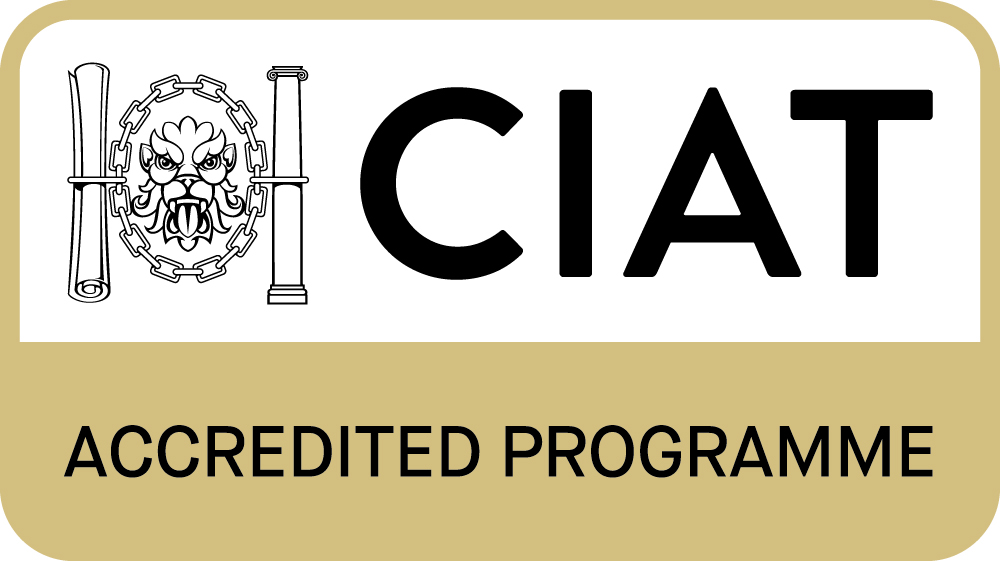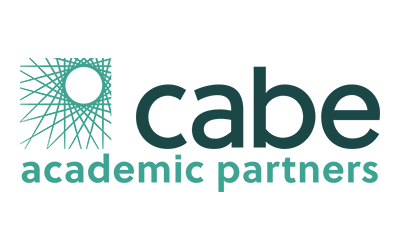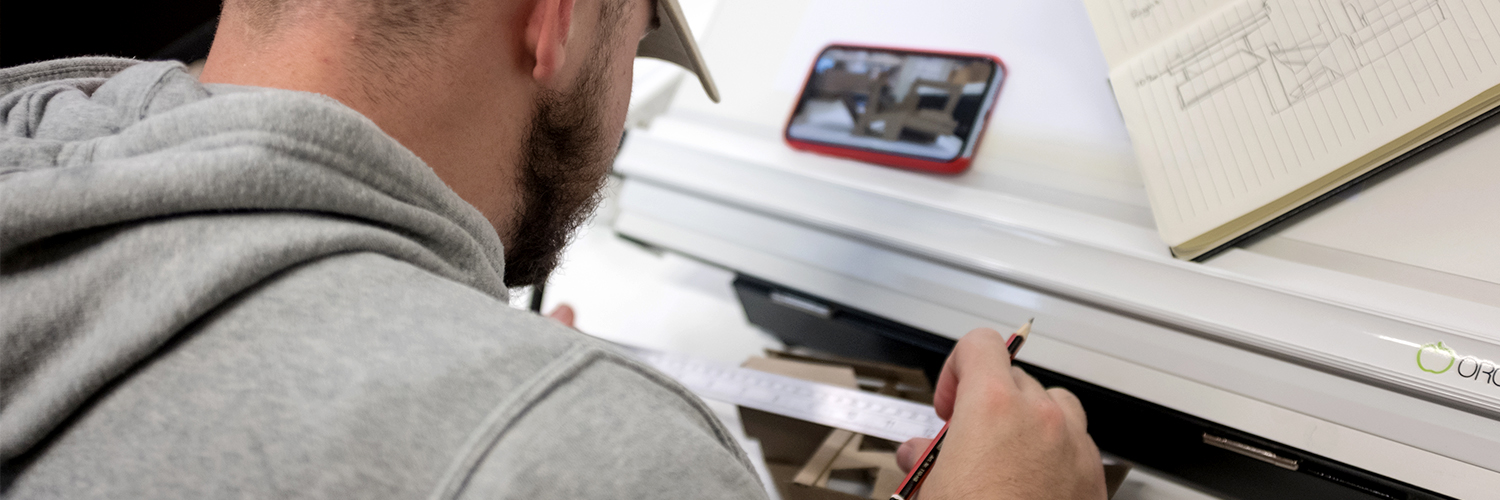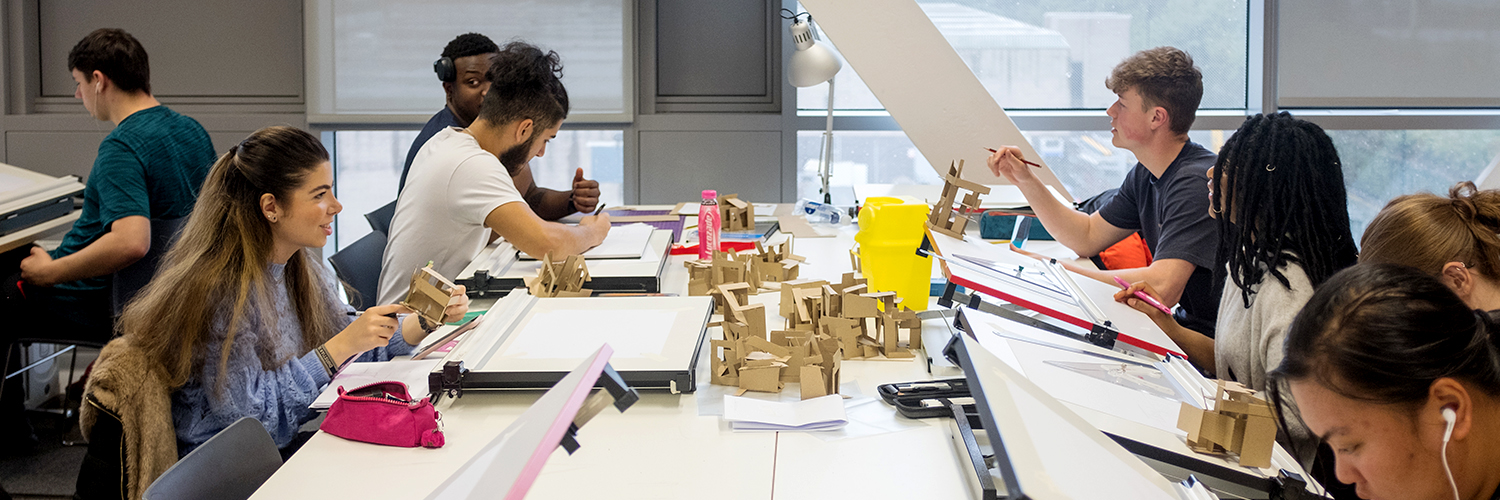
Architectural Design and Technology with Foundation Year
Full-time
Four year
Five year
September 2026
In a nutshell
Behind every grand design is great technique. In our increasingly digital-driven built environment, a degree in Architectural Design and Technology is a route to a rewarding career making those amazing design concepts a reality.
Architectural Design and Technology with Foundation Year course is an excellent route if you’re from a non-industry background, new to higher education, or seeking to develop your career in a new direction. Providing immersion in construction, surveying and design techniques, the foundation year pathway is designed to help you meet the prerequisites for the full BSc (Hons) Architectural Design and Technology degree.
The full honours degree is accredited by the Chartered Institute of Architectural Technologists (CIAT) and Chartered Association of Building Engineers (CABE), so you will be educated to the highest industry standards. You will join a vibrant multidisciplinary community, learning alongside architects, building surveyors, construction managers and quantity surveyors.
Start your study journey
Register for our next Open Day to learn more about studying Architectural Design and Technology with Foundation Year, explore our facilities and meet the course team
You will:
- Develop competence in essential areas of built environment professional practice
- Build technical, analytical and problem-solving skills, ready to progress on to the BSc (Hons) Architectural Design and Technology degree
- Gain hands-on experience using built environment focused IT equipment and software
- Build your confidence by strengthening team working, communication and study skills
options available
Course accreditations


This is for you if...
You’re passionate about buildings and architecture and want to develop and shape the built environment
You want to study architectural design and technology but don't meet the Honours degree entry requirements
You're returning to education or seeking to develop your career in a new direction
All about the course
Foundation Year
The introductory foundation year will build your understanding of situations and solving problems in the built environment. With a focus on progression, the foundation year introduces the core practical, problem-solving and communication skills you will need to succeed at an advanced study level.
Once you successfully complete and pass the foundation year, you will progress to our full BSc (Hons) Architectural Design and Technology degree.
BSc (Hons) Degree
For a further three years of study, you will build competency and understanding of architectural design theory as you complete practical projects. As you build BIM and CAD design skills, work on live briefs and learn to manage design information, you will realise the value of robust design in transforming our built environment.
Our range of modules will introduce you to the architectural design processes in year one, and you’ll begin to use advanced software packages, manage design information, and develop design skills as you progress onto year two. In your final year, you’ll continue to develop a design portfolio and complete a final project of your choice where you can interact with industry experts.
Learn more about the current course modules in the section below.
Learning Experience
From our location at the heart of Greater Manchester, our expert academic team draws on close industry partnerships with architecture, engineering and construction sectors, to bring you guest lectures, networking opportunities and local architectural projects that will support your knowledge and skill progression.
Based at our green Peel Park campus, you will thrive in our dynamic studio environment. There’ll be plenty of opportunities to tackle real life creative project briefs, sketch ideas and make models, as you fill your Instagram feed with impressive local architecture. As a student at Salford, you’ll also showcase your design skills at our annual Degree show so you will receive an immersive, rewarding learning experience.
Industry Placement
On this course, you will have the option to take an industry placement between years two and three. Although you will be responsible for securing your own placement, our tutors will support you all the way, from helping you to apply to providing support while you are on placement.
IT and Study Skills
This module is designed to equip you with a set of skills, knowledge and personal attributes that ensure the student is likely to be successful in their chosen route of academic study on a course within the School of the Built Environment. You will develop the ability to understand what and how they are learning, and to review, plan and take responsibility for your own learning.
Introduction to Built Environment Professional Practice
This module will introduce you to the range of sectors and professions involved in the built environment sector. You will also gain an understanding of the role of the different professions, and begin to explore the concept of health and safety in industry.
Introduction to Design Practice
The aim of this module is to provide you with an appreciation and understanding of architectural design and the factors that influence it. You will gain an understanding of architectural design in the context of the overall building procurement process, and be introduced to the role of ICT as an essential tool in built environment professional practice. Through this module you will begin to develop your expertise in commonly used built environment design representation software applications.
Professional Practice Project
This module introduces the process of client/architect/engineer design briefs, and particular specifications in relation to a building’s internal environment, with particular attention paid to the specification of thermal, visual, acoustic and Indoor Air Quality (IAQ) design variables. Building on the theory learned in the Introduction to Building Science module, this module moves on to the design and practical application of environmental design criteria based on the previously developed understanding of environmental comfort.
You will research into, and select, various design variables during the creation of project Room Data Sheets (RDS), used by engineering consultants to design passive and active approaches to the creation of an optimum internal environment for occupant comfort and wellbeing. The module then moves on to the determination of actual environmental conditions in numerous rooms and spaces in a variety of building types via the physical use of measuring equipment. By comparing theoretical and actual design values, you will then undertake observations and Post Occupancy Evaluation (POE) surveys to determine real occupant opinions and perceptions as to their working environment, with the goal of assessing those areas of design with poor feedback and the proposal of corrective measures.
Introduction to Architectural Design
With a focus on 'learning by doing', the module is delivered as a studio-based framework, where a series of small exercises will encourage you to add experimentation and innovation to your projects. You will complete a design project, which combines guided learning/tutorial and independent study. The outcome of the project will vary depending on the purpose of the design brief. We will also use the Virtual Learning Environment (VLE) to enhance your learning experience.
A range of assessment methods will provide you with the opportunity to demonstrate your skills. This will include summative assessment of the projects based on the predefined criteria and formative assessment through design critic.
Principles of Architectural Structure
This module aims at providing a fundamental understanding of the design principles and behaviours of structural forms, elements and systems in buildings. You will be introduced to nature as a generator of structure. You'll explore the relationship between shape, material, structural performance, loads, assembly methods and construction technology through modelling, analysis, and case studies. You will be able to understand the mutual dependencies between architectural design, structural performance and manufacturing technologies in the past and present through the knowledge of historical and contemporary structural forms and materials. The module also enables you to investigate the implications of nature, people and technology in the design of architectural structures.
Architectural Design for Construction 1
This module will introduce you to construction technology, and how this is described, detailed, and specified as part of the architectural design process. Using the domestic house as a framework, module lectures start from the bottom-up covering foundation and ground slab design, and progress to explore wall, roof, stairs, windows, and doors, first floor construction, plus internal elements in terms of forms of construction, materials and performance.
The module is delivered using lectures and seminars, and is assessed using coursework that will include detailed drawings, specifications, and detail models.
Architectural Representation and Modelling
This module will introduce you to Computer Aided Design, hand drawing and model making, as techniques for communicating the design and construction of buildings. You will learn how to use draughting and rendering software, the basics of Building Information Modelling, sketching, model making, and the production of scale drawings and details, by hand.
The module content is delivered in our architecture studio and workshop. Assessment will require you to submit physical models, hand drawings and computer renderings
Introduction to the Role of the Quantity Surveyor
On successful completion of this module, you will be able to demonstrate knowledge of the role of the quantity surveyor and the activities a quantity surveyor would undertake in the pre-construction phase of a project. The modules progresses understanding of the processes of financial and cost control during the construction phase of a project and involves the area of contract administration during the pre-construction and construction phases of a project.
Introduction into Law and Regulatory Framework
You will be introduced to English Law and relevant statutory requirements for studying for vocational qualifications in the construction and property professions. You will e-learn about the workings of the English legal system, to the law relating to contracts and to the regulatory framework affecting the use, management and development of land, in particular, planning, building control and the CDM regulations.
History of Architecture and Construction (ADT)
Explore the history of architecture and construction. This module provides insight into historic construction, along with an understanding of how ideas and technology have changed and continue to change the design of buildings. The module narrative starts in Salford at the beginning of the 19th Century with the ‘shock city’ of the Industrial Revolution, and moves through 20th century modernism, to cover emerging 21st century ideas of sustainability, ecological design, and off-site manufacturing. Having this contextual knowledge will give you a greater understanding when working with, or integrating into, a historic environment, how conservation and re-use can be informed by an understanding of architectural history. It will also provide insight into how technology and ideas develop.
We deliver the module using lectures and seminars, and use a final essay for assessment. In this module, we will also introduce library skills in research and referencing (delivered by the University’s library team).
Design and Construction Management (ADT)
A fundamental element of an Architectural Technologist’s role is to communicate the building design and construction information in specifications, schedules, drawings and contract documents. In this module, We will teach you specification writing using the National Building Specification (NBS), and material and component specification using reference to British Standards, Codes of Practice, and BREEAM Certification. We will also explore software for preparing design and construction programmes, and the use of BIM in preparing construction contract packages.
The module is delivered using lectures, seminars, and software demonstration. You will be assessed through a design report that will include all aspects of construction documentation– specification, programme, contract documents and Health and Safety – in a design project.
Architectural Design for Construction 2
Building on your knowledge and skills, this module will further develop your understanding of technological innovation in architecture integrating the parallel strands. You will consider more advanced construction techniques, systems and assemblies for non-domestic buildings. Through this, you will extend and develop your technical vocabulary and grasp of building physics for more complex building forms in terms of scale, storeys, and medium and long clear spans.
Architectural Design and Regulation
This module focuses on aspects of the statutory and regulatory context within which architectural technologists operate. Topics includes building regulations, inclusive design legislation, environmental laws, planning legislation. A particular focus is on the application of the regulations to a particular project and the assessment is based on an analysis and graphic explanation of the regulation as applied to a building design.
The module is delivered using a combination of lectures, seminars and studio projects.
Procurement and Administration
This module enables you to explore and differentiate the principal types of procurement systems and associated contracts used in the UK, you will also explore the fundamental procedures related to contract administration.
Development Appraisal and Viability
The purpose of the module is to provide you with a good working knowledge and understanding of the aims and objectives of delivering a property development scheme. You will be able to identify opportunities, undertake feasibility studies and development appraisals to ascertain the viability of a proposed project or site. You will be required to understand a variety of funding options and how to apply them dependent on your client’s needs.
Environmental Architectural Technology
You will develop an holistic understanding of tectonics for local and global environmental challenges. You will assess the impacts of building performance on the built environment. You'll apply the principles of technological engineering systems in sustainable design and construction processes to a design solution. You will also apply technical regulatory factors that impact build, sustainability and environmental performance within broad societal concerns.
Integrated Architectural Design and Practice
This module incorporates the final design project of the course - an opportunity to pull together and demonstrate all the skills and knowledge you have acquired in a single medium sized project with a brief and site of your own choosing. The assessment will require the submission of a comprehensive package of design and construction information including a physical and historic site analysis; a brief; plans, sections, elevations, selected details, and renderings of the proposed building and site context (including a physical/computer model of the building).
Sustainable Conservation and Reuse of Buildings
Delivered using our design studio, in this module, you will prepare a design for the conversion of an existing building (on the University Campus), including a measured and condition survey of the building. The module is taught in the design studio. You will be assessed through a design project which includes a brief for the project, together with plans, sections, elevations, selected details, and renderings. of the building as existing and as proposed. You will also complete a design report describing how the building performance will be improved whilst preserving the historic aspects of the building.
Modern Methods of Construction
This module provides you with knowledge of Modern Methods of Construction (MMC) and an introduction to a range of MMC techniques. Through a focused series of lectures, we will reveal the role of offsite manufacture, platform thinking, generative design, robotics, intelligent building, kinetic architecture, logistics and sustainable considerations.
Building Performance Modelling
In this module, you will use an existing model of a proposed medium-sized building to undertake a range of performance evaluation and provide an illustrative report about how the building performance maybe improved. Delivered using our architectural design studio, the module activities will help you to become aware of the current range of performance modelling analytical tools.
Discipline Research Project
You will learn to write and deliver an extended and coherent study on a design related topic. On completion, you will demonstrate competency in research skills in support of future learning development. This module will help you to develop the skills of reflective practice through engagement with contemporary architecture and urbanism.
We take a flexible approach to our course delivery that promotes diversity and inclusivity and provides a blended learning experience, which will vary to meet specific programme requirements. This learning time includes formal lectures and interactive activities such as seminars, tutorials, practical sessions, laboratory and studio learning. Smaller classes may be used to support collaborative activities such as project and group work and presentations. A range of different assessments and feedback is offered to meet the needs of both our diverse student body and specific subject needs.
Our undergraduate courses are normally made up of 20 credit modules which are equal to 200 hours of learning time. A three-year degree qualification typically comprises a total of 360 credits (120 credits per year).
Please note that exact modules and content offered may vary in order to keep content current and, for courses that offer optional modules, may depend on the number of students selecting particular options. When accepting your offer of a place to study on a programme with optional modules, you should be aware that optional modules may not all run each year. Your tutor will be able to advise you as to the available options on or before the start of the programme. Whilst the University tries to ensure that you can undertake your preferred options, it cannot guarantee this.
Frequently Asked Questions
What is a foundation year?
A foundation year offers a year of studying to gain an understanding of the programme before progressing to the full three-year studies. You'll get the chance to understand the way higher education studying works and gain the relevant skills and knowledge needed to undertake the full degree.
What is Architectural Design & Technology?
Architectural Design & Technology is a key part of architecture, especially pre-construction processes. This field focuses on the automation and augmentation of the design process to ensure high-performance of materials, systems, and structures.
What’s the difference between architecture and architectural design and technology?
Architecture is the wider definition for the construction of structures while architectural design and technology focuses on the pre-construction design processes. This field specifically focuses on the use of CAD (computer-aided design) to improve these processes.
Is it hard to study architectural design and technology?
Like many architecture programmes, studying Architectural Design and Technology can be challenging since it involves many practical aspects and tasks, however, our students find our programmes incredibly rewarding when gaining a wide range of skills during their studies.
There are methods to ensure you’re getting the best of your degree, including practicing good time management and making time for yourself to recharge. If you find your studies overwhelming, there will be support available from your lecturers and university support staff.
Is an architectural technologist the same as an architect?
No, an architectural technologist is not the same as an architect, though their roles often overlap. Architects have a broader focus on the creative and design aspects of buildings, including aesthetics and spatial arrangements, and are generally more involved in client interaction. Architectural technologists, on the other hand, tend to specialize in the technical and practical aspects of building design and construction, such as material selection, construction methods, and compliance with building regulations.
How much does an architectural technologist make in the UK?
In the UK, the salary for an Architectural Technologist varies based on experience and location but generally ranges from £23,000 to £50,000 per year. Entry-level positions typically start at £23,000 to £26,000, while experienced professionals can earn up to £50,000 or more.
School of Science, Engineering and Environment
Rising to the challenge of a changing world, our degree courses are designed to shape the next generation of urbanists, scientists, engineers and industry leaders.
Driven by industry, and delivered by supportive programme teams, you can develop the knowledge and skills to become unstoppable in your career.
Facilities
As an Architectural Design and Technology student, you will learn in our specialist architectural design studios which provide an inspiring environment to develop ideas, work collaboratively and share best practice.
You will also have access to workshops on campus which house high specification equipment, including laser cutters and 3-D printers, to help you bring your ideas and concepts to life.
Industry collaboration and research
When you start this degree with Salford, you are also joining a community making a difference in industry, our local region and in our wider society.
Many of our academics and technicians who support your course also deliver collaborative, interdisciplinary, high-impact work in a range of local and global built environment issues and challenges.
Discover how you are part of something bigger.
What about after uni?
EMPLOYMENT
As you progress and successfully complete the full BSc (Hons) Architectural Design and Technology degree, you will graduate with diverse and rewarding career opportunities ahead of you. Architectural technologists, and software management skills they possess, are highly-sought by industry, both in the UK and overseas.
As an architectural design and technology graduate, you will be well-placed to apply for graduate design-based roles. Our architecture alumni have progressed to work with regional and international design firms, government organisations and consultancy practices such as MHA Architects, Walker Simpson Architects, and Mason Gillibrand Architects.
FURTHER STUDY
You might find you want to learn more about the built environment. We offer a range of specialism postgraduate study options to help you take your career and interests even further. Salford graduates and alumni also receive a significant fees discount.
MSc Project Management in Construction
MSc BIM and Digital Built Environments
MSc Real Estate and Property Management
What you need to know
APPLICANT PROFILE
In addition to our academic entry requirements, we also look for certain characteristics in each applicant. Having these characteristics will not only help you to fulfil your academic potential, but they are also essential if you want a successful built environment career.
INTERNATIONAL APPLICANTS
This course isn’t suitable for international students. If you are an international student and interested in studying a foundation year, please consider our International Foundation Year course.
ENGLISH LANGUAGE REQUIREMENTS
All of our courses are taught and assessed in English. If English is not your first language, you must meet our minimum English language entry requirements. An IELTS score of 6.0 (no element below 5.5) is proof of this, and we also accept a range of equivalent qualifications.
Read more about our English language requirements, including information about pathways that can help you gain entry on to our degree courses.
GCSE
In addition to Level 3 requirements, you must have evidence of Level 2 GCSE English and Maths at Grade C/4 or above.
UCAS tariff points
64 points. At least one full A level is required.
A level
64 UCAS Points. At least one full A level is required.
BTEC Level 3 National Extended Diploma
MPP
T level
Overall Grade P (D or E) in any Subject.
Access to HE
A minimum of 64 UCAS Tariff Points from a QAA Approved Level 3 Access to HE Diploma.
Scottish Highers
64 UCAS Tariff Points from Higher level.
Irish Leaving Certificate
64 UCAS Tariff Points from Higher level.
International Baccalaureate
24 points overall. Must have passed the full International Baccalaureate to be considered.
Salford Alternative Entry Scheme (SAES)
We positively welcome applications from students who may not meet the stated entry criteria but who can demonstrate their ability to pursue the course successfully. Once we receive your application, we'll assess it and recommend it for SAES if you are an eligible candidate.
There are two different routes through the Salford Alternative Entry Scheme and applicants will be directed to the one appropriate for their course. Assessment will either be through a review of prior learning or through a formal test.
How much?
| Type of study | Year | Fees |
|---|---|---|
| Full-time home | 2026/27 | £8,505 for Foundation Year and £9,535 for subsequent years. |
The government has recently announced that university tuition fees for home students in England will increase every year in line with inflation from 2026 onwards. We are awaiting further guidance on how this will be calculated, and will update here and on our fees webpage as soon as details are announced, as well as communicate with any existing offer holders for September 2026.
Additional costs
You should consider further costs which may include books, stationery, printing, binding and general subsistence on trips and visits.
All set? Let's apply
Enrolment dates
Student information
Terms and conditionsUCAS information
Course ID K194
Institution S03



